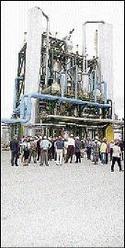
The Petrojam Ethanol Dehydration Plant at Marcus Garvey Drive, Kingston. - File
Biofuel producer Petrojam Ethanol Limited has now satisfied its contractual obligations to former partner Coimex, freeing the state to transfer ownership of the plant to Infinity BioEnergy as part of a stalled sugar deal.
PEL was an elventh-hour throw-in by the government to sweeten the deal for Infinity, which, nominally, is buying 75 per cent of the government's sugar production business, including the ethanol plant, for US$100 million.
Raising eyebrows
Under the arrangement PEL was valued at US$25 million, a price that initially raised eyebrows and now has been confirmed by highly placed sources to have been undervalued by 20 per cent.
These sources say that government might have acted hastily in finalising the transaction.
"The arms-length value (of PEL) is in excess of US$30 million," said one source.
There, however, could still be time for the government to salvage the seeming pricing mis-step if cash-strapped Infinity is incapable of consumating the acquisition.
After two postponements, last September and December, there is doubt that Infinity can close, notwithstanding government's several assertions to the contrary. The latest timetable for finalising the deal is some time this month, although no specific date has been announced.
PEL's obligations to Coimex surrounded an 'over-hang' in supply of fuel grade ethanol to Coimex that PEL satisified fully in October/November on delivery of a negotiated 53,000 cubic metres of fuel to the Brazilian company, according to energy expert and board director of Petroleum Corporation of Jamaica, William 'Bill' Saunders.
Joint venture
Coimex, up to last year was a joint venture partner with PCJ in PEL, under a complex arrangement that gave the Brazilian company temporary ownership of a piece of the plant, and rights to fuel grade ethanol processed from the hydrous ethanol that it supplied to the 40 million gallon capacity plant.
That arrangement began when Coimex provided the cash to refurbish and upgrade the Marcus Garvey Drive plant that was mothballed for several years.
The deal required that Coimex be repaid out of profit over three years, ending June 2008, after which full ownership of the facility would revert to PCJ. Additionally, Coimex had an agreement to deliver feedstock to the plant.
But, over time, events linked to delays in raw material shipments, mechanical failures at the plant and natural disasters in Jamaica, derailed production targets, resulting in a shortfall in volumes and a breach of the supply agreement.
Consequently, the supply side of the deal was extended, initially for a year, for PEL to complete its delivery of ethanol to Coimex.
"At the time we were not aware of the PEL sale," said Saunders.
The new deal was for production of 106,000 cubic metres of ethanol and a '50:50' share of profit from the sales.
But almost immediately after PEL and Coimex shook hands on the arrangement, the Golding government advised parent PCJ that PEL would be co-opted into the sugar deal, forcing the energy agency back into talks with Coimex.
PCJ proposed cutting production to 53,000 cubic metres and giving over all profits to Coimex, to which the Brazilian company agreed.
Incidentally, Coimex, one of Brazil's largest sugar and ethanol producers, was among the companies that showed initial interest in going after the SCJ assets.
Reconciling accounts
PEL processed the ethanol in four to five months. The only thing remaining is the reconciling of accounts and settlement of outstanding expenses, such as demurrage charges, said Saunders.
But even with the way cleared, up to this week, there was no final word on whether Infinity BioEnergy would follow through on the sugar transaction that would require it to pump US$100 million of capital into an operation swamped by debt and burdened by inefficiencies, low technology, and an over-reliance on manual labour.
Faced with those realities, the Brazilian company had balked initially at following through on its bid for the assets of the Sugar Company of Jamaica, but was persuaded after Petrojam Ethanol was thrown into the pot as a US$25 million sweetner.
Jamaica's Sugar Enterprise Team, which handled the divestment, acknowledged mid-summer that PEL was the crowning jewel in the transaction.
Government's right
Saunders, who was the founding managing director of the near 30 year-old PCJ, had no comment on the assets valuation under the sugar transaction, saying it was the government's right to utilise its assets as it deems fit.
He acknowledged, however, that there was no quid pro quo for PCJ.
Infinity BioEnergy, if it follows through on the acquisition, will use a vehicle called NewCo to hold its Jamaican assets, including five sugar factories, mostly leased sugar lands and PEL.
The Golding administration has not said which state agency will become the guardian or holder of its interest in NewCo.
"It's for government to decide which entities will hold the 25 per cent," said Saunders.
But, given that Infinity will be engaged in the production of ethanol and electricity, two energy-related activities, it is logical said Saunders that the stake be vested in the PCJ.
lavern.clarke@gleanerjm.com